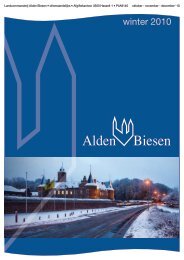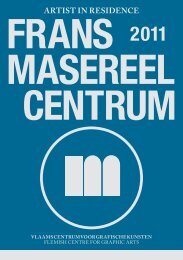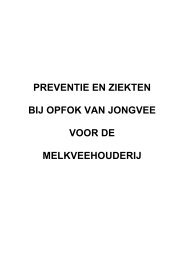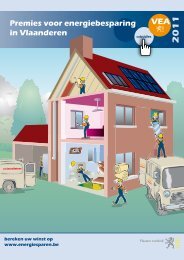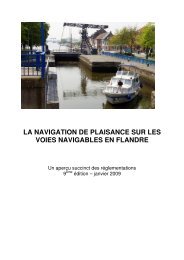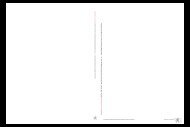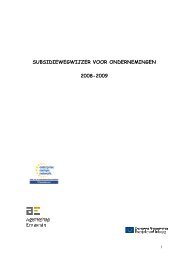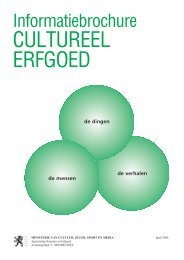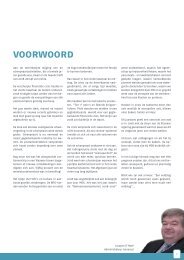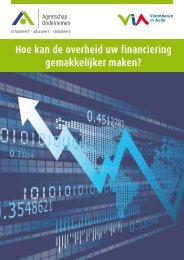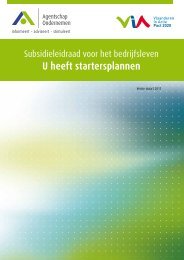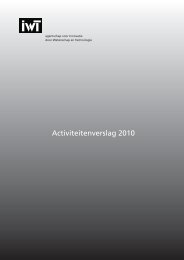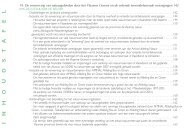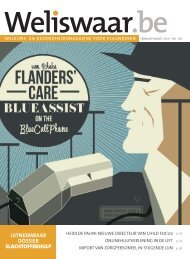Acknowledgements Book of abstracts - Publicaties - Vlaanderen.be
Acknowledgements Book of abstracts - Publicaties - Vlaanderen.be
Acknowledgements Book of abstracts - Publicaties - Vlaanderen.be
Create successful ePaper yourself
Turn your PDF publications into a flip-book with our unique Google optimized e-Paper software.
José Kok presents Workshop paper 5<br />
In workshop 2: Assessment <strong>of</strong> zoo animal welfare<br />
Friday, 12 Septem<strong>be</strong>r 2008 from 14h00-15h45 in the Het Pand chaired by Paul Koene<br />
APPRAISAL OF ZOO ANIMAL WELFARE<br />
J. Kok 1,2 , J.H. van Weerd 3,4<br />
180<br />
Workshop paper 5<br />
1 Ouwehand Zoo Rhenen, Greb<strong>be</strong>weg 111, 3911 AV Rhenen, The Netherlands<br />
2 Alertis, PO Box 9, 3910 AA Rhenen, The Netherlands<br />
3 Artis Royal Zoo. Plantage Kerklaan 38-40, 1018 CZ Amsterdam, The Netherlands<br />
4 Dutch Zoo Federation (Nederlandse Vereniging van Dierentuinen), P.O. Box 15458, 1001 ML Amsterdam,<br />
The Netherlands<br />
Animal welfare is the Achilles-heel <strong>of</strong> zoos. Whatever the raison-d’être zoos may claim, if welfare<br />
<strong>of</strong> the animals in their care is compromised, their very existence <strong>be</strong>comes subject <strong>of</strong> debate.<br />
It is therefore in the interest <strong>of</strong> zoos to safeguard the welfare <strong>of</strong> the animals in their care. Unlike<br />
domestic livestock, animals in zoos are perceived to <strong>be</strong> the living representatives <strong>of</strong> their wild<br />
counterparts. The animals’ welfare is therefore <strong>of</strong>ten judged in conjunction with their - captive –<br />
environment, and emphasis is put on the animals natural <strong>be</strong>havior. Stereotypies, functional as they<br />
may <strong>be</strong> for an individual animal to cope with adverse circumstances and once acquired difficult to<br />
lose, are the more obvious under zoo circumstances and viewed as pro<strong>of</strong> that the artificial<br />
environment is inadequate.<br />
The Netherlands have only recently introduced legislation to safeguard a certain measure <strong>of</strong> quality<br />
in zoos. In 2002 the European Zoo directive <strong>of</strong> 1999 was made into Dutch law. Typically, the<br />
legislation mention species-specifity and the possibilities <strong>of</strong> the artificial zoo-surroundings to allow<br />
for this, viz. locomotion, climate and biorhythm, social <strong>be</strong>havior, mating <strong>be</strong>havior and excretion.<br />
Dutch zoos are exploring possibilities for self-evaluation and quality control and have developed<br />
their own protocols for pr<strong>of</strong>essional ethics. Also in these, the possibility for allowing as much as<br />
possible for species specific life processes is pivotal. At the same time, the European zoos as a<br />
whole have laid down minimum standards for keeping species in husbandry guidelines. These<br />
mostly apply to the physical aspects <strong>of</strong> the zoo environment.<br />
Animal welfare or its absence is difficult to ascertain under zoo circumstances. Minimum standards<br />
in this respect do nothing more than attempting to safeguard the absence <strong>of</strong> suffering. Zoo standards<br />
should <strong>be</strong> aiming at increasing the animals well<strong>be</strong>ing, by not only providing the minimum physical<br />
circumstances, but also by eliciting species specific <strong>be</strong>havior and characteristics.<br />
Contact information: José Kok or email jose.kok@ouwehand.nl<br />
Complete address: Ouwehand Zoo Rhenen, Greb<strong>be</strong>weg 111, 3911 AV Rhenen, The Netherlands<br />
Species: Zoo animal



